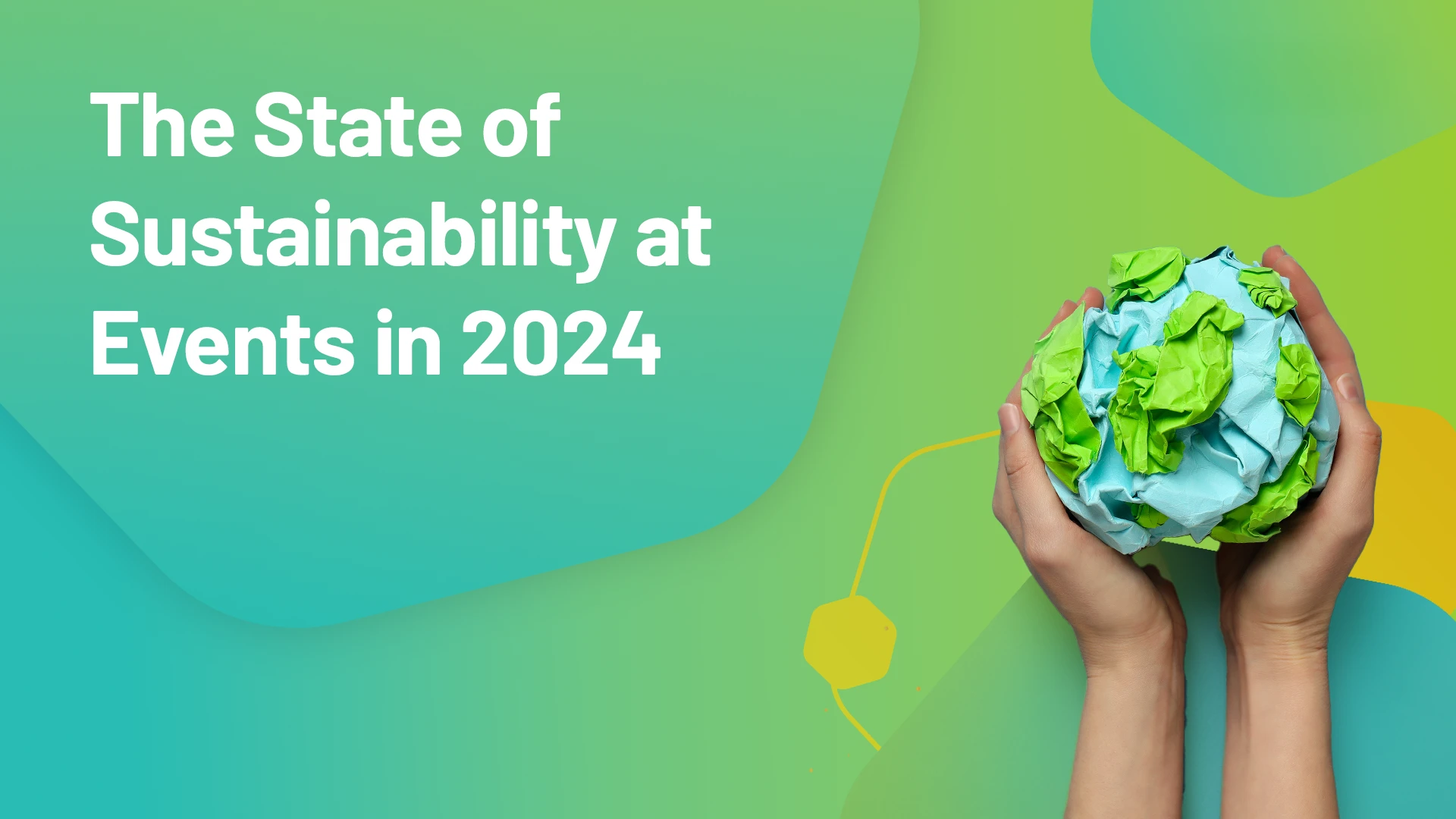Views
Partager :
Partager :
Partager :
The event industry is evolving at a rapid pace, and 2024 is shaping up to be a year full of exciting innovations. From hybrid events to sustainability initiatives, staying ahead of these trends will give event planners the edge they need to create memorable and impactful experiences. This article dives into the key trends that will dominate the event landscape in 2024, offering insights into what you need to know to stay competitive.




Hybrid Events Continue to Reign Supreme
While in-person events have made a strong comeback post-pandemic, hybrid events—those that combine physical and virtual experiences—are here to stay. In 2024, hybrid models will become even more refined, offering personalized experiences for both physical attendees and virtual participants.
What to Expect:
Hybrid events will focus on creating seamless integration between the two formats. This will involve more advanced use of virtual platforms, AI-driven personalization, and interactive elements that engage both audiences equally.
Virtual Networking Boost: New AI-driven networking tools will allow virtual attendees to connect as effectively as those attending in person, blurring the line between physical and digital events.

Sustainability Takes Center Stage
With increasing awareness around climate change, sustainable event planning will no longer be an option—it will be a necessity. In 2024, event organizers will need to focus on eco-friendly practices, from reducing waste to opting for energy-efficient venues.
Key Actions for Sustainability:
Reduce plastic usage by opting for biodegradable materials.
Offer digital alternatives to printed brochures and invitations.
Choose venues that have strong sustainability policies, such as energy-efficient lighting and waste management programs.
Example:
Eco-Friendly Catering: Event planners are expected to work with caterers that offer locally sourced, organic options and implement food waste management practices.

Immersive Technology Steals the Show
In 2024, technology will continue to play a pivotal role in shaping event experiences, but the focus will be on immersion. Augmented Reality (AR), Virtual Reality (VR), and AI will allow attendees to interact with the event in new and meaningful ways.
AR and VR Experiences: AR and VR will elevate the event experience by allowing attendees to engage in fully immersive environments. Whether it’s a virtual product demo or a simulated networking experience, these technologies will become standard.
AI for Personalization: AI-powered tools will personalize event experiences for each attendee, from customized agendas to personalized networking recommendations, creating a more engaging and tailored experience.
Data-Driven Decision Making
The use of data to shape event planning, execution, and post-event analysis will become even more critical in 2024. With more advanced data analytics tools, event organizers can make real-time adjustments and gather deeper insights about attendee behavior and engagement.
What Data Can Do:
From predicting attendee preferences to measuring engagement at specific sessions, data will allow for more dynamic event management, ensuring that each event maximizes its potential.
Real-Time Adjustments: With live feedback tools and data tracking, event organizers can make immediate changes to the event agenda, such as altering speaker schedules or session formats based on attendee participation.
Diversity and Inclusion Become Non-Negotiable
2024 will see diversity and inclusion move from being a trend to a foundational element of event planning. This means ensuring that events are accessible and welcoming to attendees of all backgrounds, including different abilities, genders, and cultures.
Best Practices for Inclusion:
Ensure all venues are accessible to people with disabilities.
Provide content and sessions that cater to diverse audiences.
Include diverse speakers and panelists to reflect a range of perspectives.
Multilingual Support:
Events with international audiences will increasingly provide multilingual content, including live translations and subtitles, to ensure that everyone can participate equally.
Micro-Events on the Rise
Large-scale events will always have their place, but micro-events—small, focused gatherings—are set to grow in popularity in 2024. These intimate events allow for more personalized interactions and create a sense of exclusivity for attendees.
Why Micro-Events Work:
They allow organizers to focus on quality over quantity, providing highly tailored experiences that offer deeper engagement. Additionally, micro-events can be more sustainable and cost-effective to run.
Hybrid Events Continue to Reign Supreme
While in-person events have made a strong comeback post-pandemic, hybrid events—those that combine physical and virtual experiences—are here to stay. In 2024, hybrid models will become even more refined, offering personalized experiences for both physical attendees and virtual participants.
What to Expect:
Hybrid events will focus on creating seamless integration between the two formats. This will involve more advanced use of virtual platforms, AI-driven personalization, and interactive elements that engage both audiences equally.
Virtual Networking Boost: New AI-driven networking tools will allow virtual attendees to connect as effectively as those attending in person, blurring the line between physical and digital events.

Sustainability Takes Center Stage
With increasing awareness around climate change, sustainable event planning will no longer be an option—it will be a necessity. In 2024, event organizers will need to focus on eco-friendly practices, from reducing waste to opting for energy-efficient venues.
Key Actions for Sustainability:
Reduce plastic usage by opting for biodegradable materials.
Offer digital alternatives to printed brochures and invitations.
Choose venues that have strong sustainability policies, such as energy-efficient lighting and waste management programs.
Example:
Eco-Friendly Catering: Event planners are expected to work with caterers that offer locally sourced, organic options and implement food waste management practices.

Immersive Technology Steals the Show
In 2024, technology will continue to play a pivotal role in shaping event experiences, but the focus will be on immersion. Augmented Reality (AR), Virtual Reality (VR), and AI will allow attendees to interact with the event in new and meaningful ways.
AR and VR Experiences: AR and VR will elevate the event experience by allowing attendees to engage in fully immersive environments. Whether it’s a virtual product demo or a simulated networking experience, these technologies will become standard.
AI for Personalization: AI-powered tools will personalize event experiences for each attendee, from customized agendas to personalized networking recommendations, creating a more engaging and tailored experience.
Data-Driven Decision Making
The use of data to shape event planning, execution, and post-event analysis will become even more critical in 2024. With more advanced data analytics tools, event organizers can make real-time adjustments and gather deeper insights about attendee behavior and engagement.
What Data Can Do:
From predicting attendee preferences to measuring engagement at specific sessions, data will allow for more dynamic event management, ensuring that each event maximizes its potential.
Real-Time Adjustments: With live feedback tools and data tracking, event organizers can make immediate changes to the event agenda, such as altering speaker schedules or session formats based on attendee participation.
Diversity and Inclusion Become Non-Negotiable
2024 will see diversity and inclusion move from being a trend to a foundational element of event planning. This means ensuring that events are accessible and welcoming to attendees of all backgrounds, including different abilities, genders, and cultures.
Best Practices for Inclusion:
Ensure all venues are accessible to people with disabilities.
Provide content and sessions that cater to diverse audiences.
Include diverse speakers and panelists to reflect a range of perspectives.
Multilingual Support:
Events with international audiences will increasingly provide multilingual content, including live translations and subtitles, to ensure that everyone can participate equally.
Micro-Events on the Rise
Large-scale events will always have their place, but micro-events—small, focused gatherings—are set to grow in popularity in 2024. These intimate events allow for more personalized interactions and create a sense of exclusivity for attendees.
Why Micro-Events Work:
They allow organizers to focus on quality over quantity, providing highly tailored experiences that offer deeper engagement. Additionally, micro-events can be more sustainable and cost-effective to run.
Hybrid Events Continue to Reign Supreme
While in-person events have made a strong comeback post-pandemic, hybrid events—those that combine physical and virtual experiences—are here to stay. In 2024, hybrid models will become even more refined, offering personalized experiences for both physical attendees and virtual participants.
What to Expect:
Hybrid events will focus on creating seamless integration between the two formats. This will involve more advanced use of virtual platforms, AI-driven personalization, and interactive elements that engage both audiences equally.
Virtual Networking Boost: New AI-driven networking tools will allow virtual attendees to connect as effectively as those attending in person, blurring the line between physical and digital events.

Sustainability Takes Center Stage
With increasing awareness around climate change, sustainable event planning will no longer be an option—it will be a necessity. In 2024, event organizers will need to focus on eco-friendly practices, from reducing waste to opting for energy-efficient venues.
Key Actions for Sustainability:
Reduce plastic usage by opting for biodegradable materials.
Offer digital alternatives to printed brochures and invitations.
Choose venues that have strong sustainability policies, such as energy-efficient lighting and waste management programs.
Example:
Eco-Friendly Catering: Event planners are expected to work with caterers that offer locally sourced, organic options and implement food waste management practices.

Immersive Technology Steals the Show
In 2024, technology will continue to play a pivotal role in shaping event experiences, but the focus will be on immersion. Augmented Reality (AR), Virtual Reality (VR), and AI will allow attendees to interact with the event in new and meaningful ways.
AR and VR Experiences: AR and VR will elevate the event experience by allowing attendees to engage in fully immersive environments. Whether it’s a virtual product demo or a simulated networking experience, these technologies will become standard.
AI for Personalization: AI-powered tools will personalize event experiences for each attendee, from customized agendas to personalized networking recommendations, creating a more engaging and tailored experience.
Data-Driven Decision Making
The use of data to shape event planning, execution, and post-event analysis will become even more critical in 2024. With more advanced data analytics tools, event organizers can make real-time adjustments and gather deeper insights about attendee behavior and engagement.
What Data Can Do:
From predicting attendee preferences to measuring engagement at specific sessions, data will allow for more dynamic event management, ensuring that each event maximizes its potential.
Real-Time Adjustments: With live feedback tools and data tracking, event organizers can make immediate changes to the event agenda, such as altering speaker schedules or session formats based on attendee participation.
Diversity and Inclusion Become Non-Negotiable
2024 will see diversity and inclusion move from being a trend to a foundational element of event planning. This means ensuring that events are accessible and welcoming to attendees of all backgrounds, including different abilities, genders, and cultures.
Best Practices for Inclusion:
Ensure all venues are accessible to people with disabilities.
Provide content and sessions that cater to diverse audiences.
Include diverse speakers and panelists to reflect a range of perspectives.
Multilingual Support:
Events with international audiences will increasingly provide multilingual content, including live translations and subtitles, to ensure that everyone can participate equally.
Micro-Events on the Rise
Large-scale events will always have their place, but micro-events—small, focused gatherings—are set to grow in popularity in 2024. These intimate events allow for more personalized interactions and create a sense of exclusivity for attendees.
Why Micro-Events Work:
They allow organizers to focus on quality over quantity, providing highly tailored experiences that offer deeper engagement. Additionally, micro-events can be more sustainable and cost-effective to run.




Quote
“The future of events is about balance—between physical and digital, global and local, sustainable and luxurious.” — Sarah Hill, Event Industry Expert
The event landscape in 2024 will be driven by hybrid models, sustainability, immersive technology, and data-driven decision-making. Diversity and inclusion will no longer be negotiable but necessary, and micro-events will grow in popularity for their tailored experiences. By staying ahead of these trends, event organizers can ensure they’re delivering the most relevant, engaging, and memorable experiences for their attendees.
Plus d'articles
Voir tous les articles
Voir tous les articles

Conseils
1 déc. 2024
How Event Planners Can Incorporate Sustainability Trends in 2024

Nouvelles
17 oct. 2024
GITEX GLOBAL puts 5G and AI at the forefront of discussions to connect and empower tomorrow’s world
By GITEX GLOBAL

Aperçus
11 sept. 2024
Frais de destination. Frais administratifs. Taxes d'accise sur l'eau.

